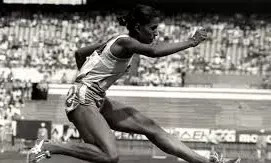Can IOA Chief PT Usha Inspire Indian Sport to Greater Heights?
PT Usha assumes office as the president of the Indian Olympic Association at a critical time

A great sportsman or woman may not necessarily become successful when he or she takes to coaching, administration or the media, after quitting the scene. These require very different qualifications and credentials, and that is why very few have succeeded when they have opted to stay involved with the sport that made them famous. They frequently start promisingly but then falter, unable to cope with the pulls and pressures that almost automatically come with the job.
PT Usha must be well aware of this as she takes over as the president of the Indian Olympic Association. Moreover she assumes office at a critical time. The IOA is an organisation that has been problematic thanks to infighting between self-seeking officials. Such is the glamour associated with sports that they seek office only for brownie points and fame caring little for the athletes.
This time the factionalism was serious enough to draw a severe censure from the International Olympic Committee and there were murmurs of a ban. A timely change of guard from the well-entrenched lobby with political links was the need of the hour, and Usha at the helm was reckoned to be the answer to the current crisis. It is up to Usha and her team to put the stables, now in disarray, in order.
'The Sprint Queen' certainly has more than a few things for her. For one thing she was elected unopposed and being the first woman president of the IOA automatically means a surfeit of goodwill. Also given her stature it is possible that even the over-bearing 'babus' in the nation's capital will give her a patient and respected hearing when she spells out her ideas.
One is sure that Usha has ambitious plans for the betterment of Indian sports. It must also not be forgotten that she is a Rajya Sabha member and so has the clout to turn her ideas into action.
There is little doubt that Usha takes up her post amidst an atmosphere of optimism and this comes chiefly from her feats on the track. Her medal winning exploits at the Asian level have been well chronicled as also her heroic run in the 400m hurdles at the Los Angles Olympics in 1984 that saw her miss a bronze medal by the narrowest possible margin – 1/100th of a second.
Fifty eight year-old PT Usha is the first Olympian and international medalist to head the apex sports body in the country. Following retirement it was but natural that Usha should turn to coaching. She established the Usha School of athletics in Koyilandy in Kerala.
Her most well known protégé is Tintu Luka who represented India at the 2012 and 2016 Olympics besides winning a total of six medals at the Asian athletics championships through 2011, 2013 and 2015. In 2015 Tintu won the gold in the 800 metres. She has won three medals (gold, silver and bronze) in the Asian Games at Guangzhou in 2010 and at Incheon four years later. Tintu has repeatedly praised Usha's technical outputs and the impressive facilities at the academy for her achievements. Usha has always believed that to nurture fresh talent one must always keep an eye on the grassroots.
Even with the exalted status she enjoys Usha could well face a tough task. The bureaucracy and red tapism in various spheres in the country is well known and sport is not immune to this. The problem is not just with the IOA but also the affiliated state units.
This has stymied the progress of Indian sports through the years. Usha and her team will have to handle this with an iron hand. Fortunately in the last decade or so thanks to increased funding by the Centre and corporated backed academies there has been a welcome change in the scenario.
A nation obsessed with cricket has started taking notice of athletes from other sports as sportsmen headed by Abhinav Bindra (shooting) and Neeraj Chopra (track and field) have won gold medals at the Olympics. Badminton is another sport where India has made significant progress as also chess.
All this has underlined the fact that Indians have the skill sets and with the right support from sports bodies and corporates more medals can be won at international meets, not just at the Asian level. Also India now has the facilities and the infrastructure to hold almost any international event and there is talk about India bidding for the Olympics sometime in the 2030s.
It will be up to Usha and her team to lay the road map for the mega event. There are several challenges ahead but somehow one gets the feeling that under Usha's tenure Indian sports will continue to rise and perhaps even enjoy its most successful era. The encomiums paid to her from sports personalities ranging from badminton star PV Sindhu to Nita Ambani, IOC member from India is testimony to her stature.
Usha has certainly started on the right foot. She said all the proper things at her first media briefing while highlighting her properties. "Except for the first 13 years I have been involved with sports all my life be it as an athlete, coach or in administration. I never thought I would become the IOA chief or a member of Parliament. We will all make a collective effort for the betterment of sports so that the tricolour flies high in the international arena. We will work with the national federations, athletes and coaches to bring more laurels for the country'' the Padma Shri awardee said.
She assured athletes that the IOA will always be easily accessible to them. Plainly put the chief objective as IOA vice president and Olympic medalist Gagan Narang said is "to take Indian sport to the next level".



